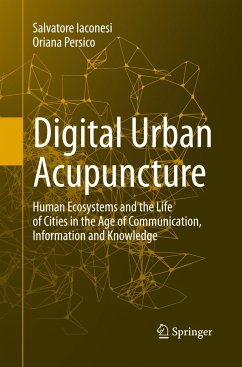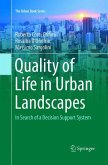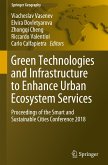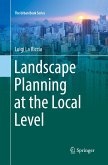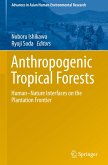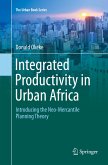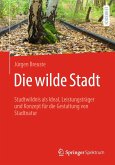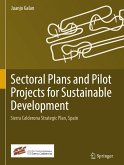This book explores the possibility to observe the lives of cities through ubiquitous information obtained through social networks, sensors and other sources of data and information, and the ways in which this possibility describes a new form of Public Space, which can be used to define new forms of citizenship and participated city governance. The work is the result of years of research across sciences, arts, design, ethnography, cultural geography, performed by multiple researchers, understanding the Relational Ecosystems of cities (the flows of relation, information, knowledge and emotion in the city) and using them to reinterpret the concept of Urban Acupuncture: from the Third Space, Third Landscape and Third Generation City, to the Third Infoscape; from Urban Acupuncture to Digital Urban Acupuncture.
The book starts by exploring the many theories and methodologies which have been used to try to capture and use the revolutionary potential found in the daily lives of cities. From De Certeau, to Latour, Bateson, Bhabha, and all the way to Castells, Clèment, Boyd, Casagrande. In a progression which moves from the Third Space (Soja, De Certeau), to the Third Landscape (Clèment), to the Third Generation City (Casagrande), to the Third Paradise (Pistoletto), the book arrives at a definition of the Third Infoscape, following up on Kevin Lynch: a new legibility and imageability of the city.
Its main themes and objectives lie in the desire to observe and understand the radical transformation of the definitions, boundaries and configurations of what we call public and private spaces, in different cultures and communities, in the age of communication, information and knowledge, and to use these understandings to formulate a set of working hypotheses for the positive, constructive, active and participatory usage of these transformed scenarios, contributing to the re-definition of concepts such as citizenship, city-governance, urban planning, civic decision-making, and more. And using, in the process, techniques such as Urban Acupuncture, Actor-Network Theory, Diasporic analysis, Peer-to-peer Urbanism and more. Multiple real-life research scenarios and documented case studies will be used, from 4 continents, coming from our research and from other international contributions.
The book starts by exploring the many theories and methodologies which have been used to try to capture and use the revolutionary potential found in the daily lives of cities. From De Certeau, to Latour, Bateson, Bhabha, and all the way to Castells, Clèment, Boyd, Casagrande. In a progression which moves from the Third Space (Soja, De Certeau), to the Third Landscape (Clèment), to the Third Generation City (Casagrande), to the Third Paradise (Pistoletto), the book arrives at a definition of the Third Infoscape, following up on Kevin Lynch: a new legibility and imageability of the city.
Its main themes and objectives lie in the desire to observe and understand the radical transformation of the definitions, boundaries and configurations of what we call public and private spaces, in different cultures and communities, in the age of communication, information and knowledge, and to use these understandings to formulate a set of working hypotheses for the positive, constructive, active and participatory usage of these transformed scenarios, contributing to the re-definition of concepts such as citizenship, city-governance, urban planning, civic decision-making, and more. And using, in the process, techniques such as Urban Acupuncture, Actor-Network Theory, Diasporic analysis, Peer-to-peer Urbanism and more. Multiple real-life research scenarios and documented case studies will be used, from 4 continents, coming from our research and from other international contributions.

